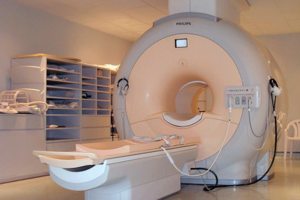
Three medical institutions in Kyiv, Kropyvnytskyi, and Zaporizhzhia received new 1.5 Tesla magnetic resonance imaging (MRI) machines purchased by the state-owned enterprise Medical Procurements of Ukraine (MPU).
According to a press release from MZU, the GE Healthcare Signa Champion MRI machines were received by the Institute of Traumatology and Orthopedics of the National Academy of Medical Sciences of Ukraine in Kyiv, the City Emergency Hospital in Kropyvnytskyi, and the City Emergency and Ambulance Hospital in Zaporizhzhia.
“The purchased models provide high-quality imaging without the use of ionizing radiation and are designed for detailed examination of the central nervous system, cardiovascular system, abdominal and pelvic organs, musculoskeletal system, as well as for the detection of oncological changes,” the Ministry of Health reports.
The devices were purchased by order of the Ministry of Health of Ukraine in 2024. These three MRI machines are the final deliveries of this equipment from the batch purchased under the 2024 budget.
In total, in 2023-2024, the Ministry of Health purchased 33 MRI machines with a magnetic field strength of 1.5 and 3 Tesla. In 2025, the Ministry of Health purchased 20 such devices with a power of 1.5 Tesla with funds from the European Union within the framework of the Ukraine Facility program.
HOSPITAL, Kropyvnytskyi, Ministry of Health, MRI, Zaporizhzhia
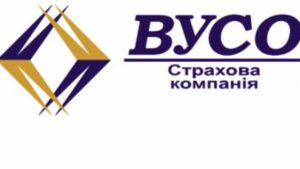
On January 6, the Lviv city municipal enterprise “Lvivvodokanal” announced its intention to conclude with IC “VUSO” (Kiev) the contract of compulsory insurance of civil liability of owners of land vehicles (OSAGO).
As reported in the system of electronic procurement Prozorro, the company’s price offer amounted to UAH 1.161 million against UAH 1.796 million expected cost of purchasing services. Insurance company Kraїna with the offer of UAH 1.177 mln and SG TAS with UAH 1.4 mln also took part in the tender.
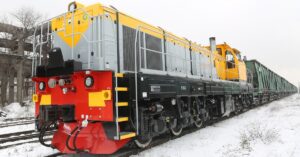
The Kryvyi Rih Mining and Metallurgical Plant PJSC ArcelorMittal Kryvyi Rih (AMKR, Dnipropetrovsk region) continues to restore the operational capacity of locomotives in railway workshop (RW) No. 2 under the GAP-III high-risk equipment repair program.
According to materials in the corporate publication Metallurg, the TEM2U-8679 diesel locomotive was recently repaired, becoming the fifth locomotive to be restored under the GAP-III repair program. The repaired diesel locomotive was put back on the rails at the end of 2025.
It is specified that five locomotives were repaired at Repair Center No. 2 under this program during the full-scale war. The purpose of these repairs is to improve the technical condition, accident-free operation, and ensure the stable operation of locomotives used for the company’s rail transportation.
The first locomotive repaired under this program was the TEM2-2203, manufactured in 1970, and the last of the five repaired locomotives was the TEM2U-8679. Specialists from ZC No. 2 and a contractor replaced the diesel engine parts, cooling sections, and wheel sets on the TEM2U-8679 locomotive, repaired the electrical equipment and cable and wire parts, installed a new battery, and worked on restoring the compressor to working order, etc.
In the future, it is planned to install modern equipment, American engines, control systems, and crew compartments on the locomotives.
ArcelorMittal Kryvyi Rih is the largest producer of rolled steel in Ukraine. It specializes in the production of long products, in particular, rebar and wire rod.
ArcelorMittal owns Ukraine’s largest mining and metallurgical complex, ArcelorMittal Kryvyi Rih, and a number of small companies, including ArcelorMittal Beryslav.

European digital-first banking group Iute Group plans to enter the Ukrainian market by launching a bank under the IuteBank brand with a focus on digital banking services for everyday financial needs, the company said on its website on Tuesday.
“This step is aimed at supporting our long-term goal of expanding digital banking services in a disciplined and responsible manner,” said Iute Group CEO Tarmo Sild.
According to the announcement, the market entry involves an agreement with the Deposit Guarantee Fund (DGF) after approval by the National Bank of Ukraine (NBU).
Under the agreement, Iute Group plans to acquire PJSC “Transitional Bank ”Iute Bank” with a banking license, to which a selective portfolio of low-risk assets and corresponding retail deposit liabilities totaling approximately EUR4 million were transferred from the insolvent RVS Bank.
The expected price of the transaction will be EUR120 thousand, with financing planned from the group’s available liquidity. Iute Group also reported that it expects the net loss of Ukrainian banking operations in 2026 not to exceed EUR3 million.
Upon completion of the transaction, the Ukrainian banking structure is to become the successor to the selected assets and deposit liabilities of RVS Bank. The assets to be transferred mainly include government bonds and cash, while the loan portfolio and related credit risks are not planned to be transferred.
The company expects that around 13,000 retail customers will be transferred as part of the deal, along with their accounts and deposits, but without the branch network.
The bank’s CEO will be Artur Muravitsky, who has over 22 years of experience in the financial sector and previously held the position of deputy chairman of the board of TAScombank and management positions at Ukrposhta, Finance Bank, and VTB Bank in Ukraine.
According to Iute Group, the initial steps after the deal is done will include capitalizing the bank, putting together a key team, and getting ready to launch digital banking services.
As reported, in December, the Deposit Guarantee Fund announced a competition for the best proposal to settle RVS Bank, which the National Bank had declared insolvent. As part of this procedure, the transitional bank Iute Bank was created, headed by Muravitsky.
According to the NBU, as of November 1, 2025, RVS Bank ranked 53rd (UAH 819.8 million) among 60 solvent banks in terms of assets.
According to information on the Iute Group website, it was founded in 2008 by Sild and Allar Niinepuu and is currently a technology-oriented financial services provider serving over 970,000 customers in the Balkans, as well as being present in the Moldovan market since 2008. The group is headquartered in Tallinn, has over 800 employees and more than 50 branches.
Iute Group expanded through several non-bank financial institutions to Albania in April 2015, North Macedonia in September 2017, and Bulgaria in February 2019, and in 2022 acquired a 95% controlling stake in Moldova’s Energbank.
Iute Group provides lending, payment, currency exchange, and insurance brokerage services.
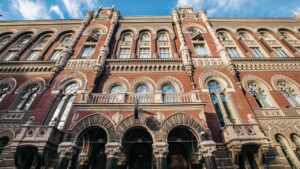
Leaders of the insurance market of Ukraine on collected premiums in January-November 2025 became insurance companies “SG ”TAS“ – UAH 7,047 billion, ”ARKS“ – UAH 5,275 billion, ”INGO“ – UAH 4,642 billion, IC ‘VUSO’ – UAH 4,639 billion, ”Arsenal Insurance” – UAH 4,458 billion.
As evidenced by the data of the project of information exchange “PRIMA” of the National Association of Insurers of Ukraine (NASU), compared to 10M2025 IC ‘Unica’, which occupied the fifth position of the leaders’ rating, has conceded this place to IC “Arsenal Insurance”.
In the market of compulsory insurance of motor civil liability at the end of 11 months, as before, were SG “TAS” – UAH 3,672 billion, “Oranta” – UAH 2,702 billion, “Knyazha VIG” – UAH -2,221 billion, ‘INGO’ – UAH 1,123 billion and “Arsenal Insurance” – UAH 1,095 billion.
Also in the cross-section of the compared periods there were no changes in the market of “Green Card”, where the top five are still “TAS” – UAH 1.150 billion, “USG” – UAH 967.4 million, ‘ROM’ – UAH 863 million, “Knyazha VIG” – UAH 351 million, “VUSO” – UAH 247.9 million.
The CASCO market, as before, is headed by IC “ARKS” – UAH 2.559 billion, “Arsenal Insurance” – UAH 2.469 billion, “VUSO” – UAH 1.202 billion, ‘Unica’ – UAH 1.143 billion and “Universalna” – UAH 1.046 billion.
The leadership in voluntary health insurance is held by the former five: IC Unica – UAH 1,839 billion, followed by IC VUSO – UAH 1,109 billion, IC Universalna – UAH 1,045 billion, IC INGO – UAH 933,4 million and SG TAS – UAH 816,5 million.
In the life insurance market, the first position is still occupied by IC “MetLife” – UAH 2.771 billion, IC ‘TAS’ – UAH 850.9 million, “Grave Life” – UAH 625.2 million, “ROM Life” – UAH 360.1 million, “Unica Life” – UAH 315 million.
As reported, as of December 1, 2025, 48 risk insurers worked in the insurance market of Ukraine, 10 specialized in life insurance, one – with a special status (“Export Credit Agency”, ECA).
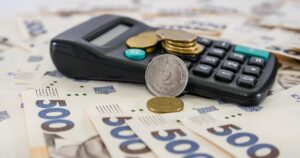
In 2026, the maximum unemployment benefit will be 8,647 hryvnia, and the minimum will be 3,900 hryvnia, according to Yulia Zhovtyak, director of the State Employment Center.
“On January 1, the minimum wage in Ukraine increased and now stands at 8,647 hryvnia. This indicator is a key economic component of the active employment promotion programs implemented by the State Employment Service. Therefore, along with this social standard, basic benefits for individuals and compensation for businesses are also automatically increased. Support for job seekers: the maximum unemployment benefit is now UAH 8,647, and the minimum is UAH 3,900 (in 2025, such benefits amounted to UAH 8,000 and UAH 3,000, respectively – IF-U),” Zhovtyak wrote on Facebook.
According to her, 1.4 million people have received such assistance since the start of the full-scale invasion.
Compensation for the employment of forcibly displaced citizens seeking work has also increased to UAH 17,294 (in 2025, it was UAH 16,000).
In addition, the coverage of expenses for the employment of veterans has increased to 8,647 UAH, and for young people under the age of 35 for their first job – to 4,323 UAH.
“Thanks to these compensation programs, almost 62,000 internally displaced persons, almost 800 veterans, and 2,800 young people have been employed,” said the director.
Among other things, compensation for the arrangement of workplaces for people with disabilities of group I has increased to UAH 129,705, and for group II to UAH 86,470 (in 2025, UAH 120,000 and UAH 80,000, respectively).
“Army of Restoration”: payment for a full month of socially useful work is now UAH 12,970. For frontline territories, as well as for veterans, it increases to UAH 17,294. As part of the “Army of Restoration” project, 82,000 people have been involved in temporary work, and more than 330,000 referrals have been issued,” Zhovtyak added.